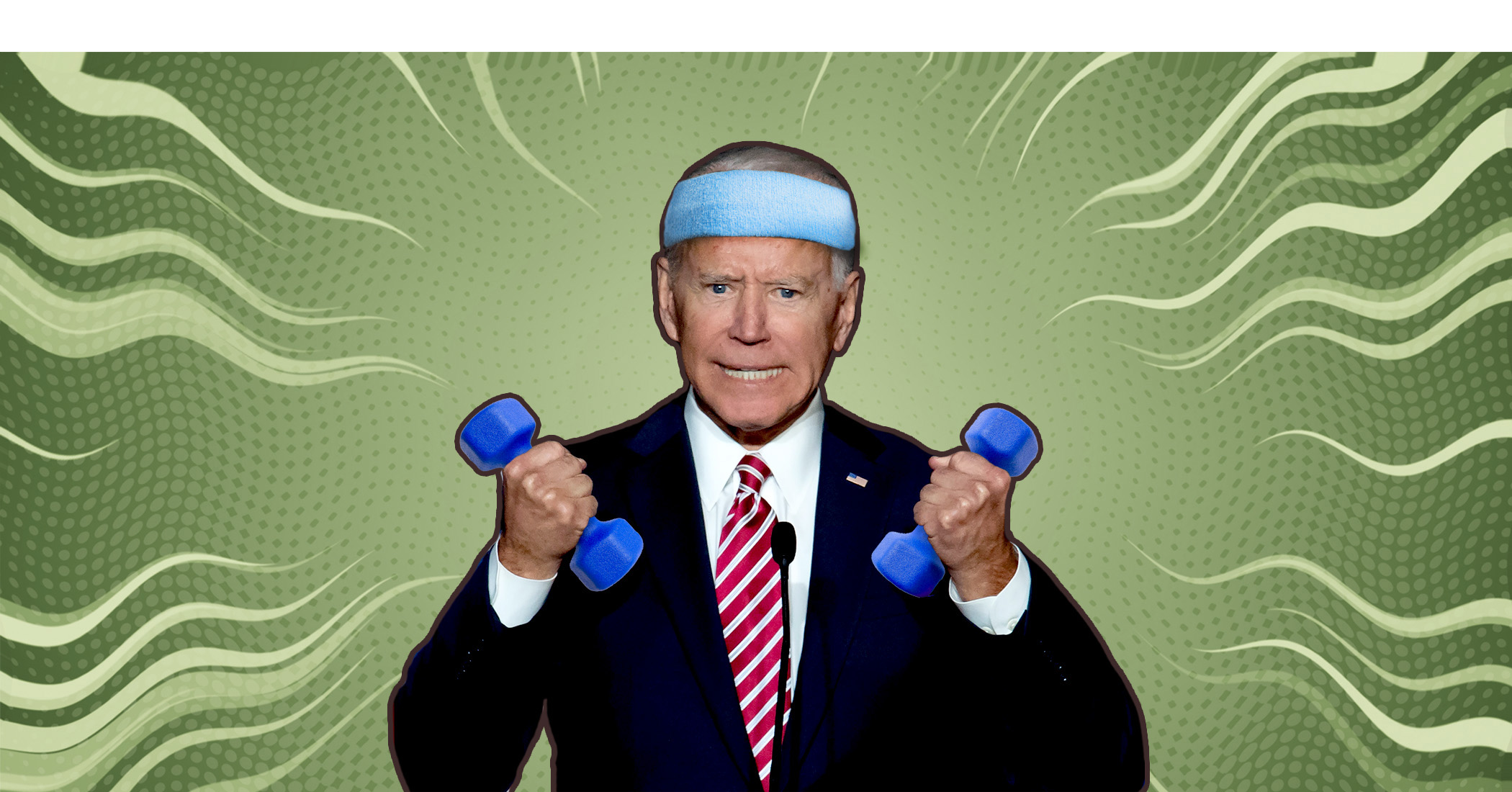Why the Democratic primary seems primed for a dark horse
It's still early and the Democrats' big three have big weaknesses


A free daily email with the biggest news stories of the day – and the best features from TheWeek.com
You are now subscribed
Your newsletter sign-up was successful
There are only two certainties about the Democratic primary.
First, that it's still very early, which means that if history is any indicator, there's plenty of time for a dark horse to end up the nominee. And second, that the top three candidates in the race — Elizabeth Warren, Joe Biden, and Bernie Sanders — have unique weaknesses that past frontrunners did not.
These two facts create an opportunity for the primary's next tier, ranging from Pete Buttigieg and Amy Klobuchar, both of whom have generated new buzz and hope after last week's debate, to Cory Booker, whose sunny approach to politicking seems well-designed to survive a bloodbath among the other contenders. In October 2019, it's just unwise to see the primary as a three horse race.
The Week
Escape your echo chamber. Get the facts behind the news, plus analysis from multiple perspectives.

Sign up for The Week's Free Newsletters
From our morning news briefing to a weekly Good News Newsletter, get the best of The Week delivered directly to your inbox.
From our morning news briefing to a weekly Good News Newsletter, get the best of The Week delivered directly to your inbox.
The Democratic primary is close to a year old. That skews our perception of where the race actually stands. Candidates have been campaigning for months and four rounds of debates have already taken place, making it easy to conclude that no one has a chance at capturing the nomination outside of the big three, since no one else has managed to break through yet.
But history suggests otherwise. Bill Clinton entered the 1992 Democratic presidential primary on October 3, 1991. Twelve years later in November and December 2003, a bevy of polls showed former Vermont Governor Howard Dean and General Wesley Clark as the top two Democratic candidates, while eventual nominee John Kerry was mired somewhere between fourth and sixth place and runner up John Edwards was sometimes even lower.
Those who follow political machinations closely also forget that many Americans who will vote in the primaries haven't tuned in yet. Over eight million viewers watched last week's Democratic debate. That sounds like a lot until we consider that more than 30 million Democrats voted in the 2016 primary — where the outcome was far less in doubt — and over 35 million voted in the hotly contested 2008 Democratic primary. If anything, the extreme enthusiasm being expressed by Americans for voting in 2020, which likely stems from the intense feelings provoked by President Trump, indicates that turnout could exceed that number in the 2020 primaries. But just because someone is extremely likely to vote in 2020 thanks to Trump doesn’t mean he or she is following each twist and turn in the primary race yet.
That means there is still an opportunity for someone else to catch fire, and the current trio of frontrunners gives us unique reason to think it will happen.
A free daily email with the biggest news stories of the day – and the best features from TheWeek.com
All three frontrunners would be the oldest president ever sworn in on Inauguration Day. And two of them, Biden and Sanders, have given voters reason to worry about their age. Biden's fumbling debate and campaign performances have fueled concerns about his cognitive capacity and his ability to handle the presidency, while Sanders had a heart attack while campaigning.
Additionally, Warren and Sanders are running unabashedly leftist campaigns. Sanders openly brags about not being a capitalist, while Warren has proposed scores of expensive new programs and systemic changes, especially a single payer health-care system that has aroused warnings from other Democratic contenders about its costs and practicality. And in last week's debate, she seemed at times shaky under fire, not only from Biden, Klobuchar, Buttigieg, and others on health care, but also from Andrew Yang on automation and Beto O'Rourke on how she was sometimes excessively "punitive". Her desire to remove American troops from the Middle East also drew fire and opened Warren to charges of extremism.
And while Warren has raised money at a prodigious clip, displayed more charisma than the other frontrunners, and impressed many with her deep policy knowledge, there are also some red flags in her electoral history: She has only won one closely contested election and relatively underperformed in her 2018 re-election, winning by roughly 24 percent. While that sounds impressive, it was actually 3 points less than Clinton won Massachusetts by in 2016, in spite of a more favorable national environment and the same margin by which Klobuchar won in a far less Democratic state.
All of which is to say the frontrunners are vulnerable on multiple counts. Each is susceptible to the argument that non-incumbent Democrats traditionally win presidential races when they can make a generational change argument. And while Sanders especially has excelled with young voters, the 78-year-old senator can't easily say to the 73-year-old president, "you're the past, I'm the future." Nor can he necessarily relate on a personal level to the economic and cultural changes afflicting millennials and Gen-Z.
Especially for the 37-year-old Buttigieg and even the 50-year-old Booker, they can with some credibility claim to better represent and understand the younger voters who are one of the crucial backbones of today's Democratic Party.
Ideologically, Sanders and Warren are particularly vulnerable because the top priority for most Democratic voters is electability and ability to beat Trump.
Sanders' socialism places him outside of the mainstream of American politics, and Warren's platform leave her open to caricature and to turning off the suburban voters in places like Phoenix, Atlanta, Houston, and Philadelphia who are trending Democratic (and were key to Democrats winning back the House of Representatives in 2018) and may be decisive in 2020. Warren might still be able to win; after all, Ronald Reagan faced similar criticism in 1979 and he won the presidency in a landslide. Still, two previous Massachusetts Democrats — Michael Dukakis and John Kerry — both far less left than Warren, succumbed to such caricatures.
Klobuchar particularly seems well positioned to capture voters with doubts about the electability of the frontrunners, especially given Buttigieg's struggles with African-American voters. While rivals Warren, Kamala Harris, Booker, and Sanders ranked as the four most liberal senators serving in the 115th Congress, Klobuchar ranked 33rd out of 50 Democrats or aligned independents, indicating that she is a solid liberal, but far harder to paint as outside of the mainstream.
Klobuchar also can argue that her proposals are far more attainable and will therefore actually better the lives of Americans than the plethora of big new programs proposed by Warren and Sanders. Her enormous popularity in Minnesota, including in regions trending Republican, also enables her to plausibly claim she can win over crucial swing constituencies, such as the white working class voters who supported Barack Obama but chose Trump in 2016.
With miles to go in the presidential race, there is certainly no guarantee that someone like Booker, Klobuchar, or Buttigieg takes fire. Indeed, in spite of the large field of Democratic candidates, many Democratic leaders are openly longing for new candidates to enter the fray who might be safer bets than Biden, Warren, or Sanders. But the concerns propelling those hopes seem more likely to elevate someone from the back of the pack than result in another nomination for Clinton or Kerry — both past losers — or the 11th hour rise of a non-politician.
The field is probably set, but it's still anyone's game.
Want more essential commentary and analysis like this delivered straight to your inbox? Sign up for The Week's "Today's best articles" newsletter here.
Brian Rosenwald is a Resident Senior Fellow at the Robert A. Fox Leadership Program at the University of Pennsylvania, co-editor of Made by History at the Washington Post, and author of Talk Radio's America, forthcoming from Harvard University Press in 2019.
-
 Movies to watch in February
Movies to watch in Februarythe week recommends Time travelers, multiverse hoppers and an Iraqi parable highlight this month’s offerings during the deep of winter
-
 ICE’s facial scanning is the tip of the surveillance iceberg
ICE’s facial scanning is the tip of the surveillance icebergIN THE SPOTLIGHT Federal troops are increasingly turning to high-tech tracking tools that push the boundaries of personal privacy
-
 ‘My donation felt like a rejection of the day’s politics’
‘My donation felt like a rejection of the day’s politics’Instant Opinion Opinion, comment and editorials of the day
-
 The billionaires’ wealth tax: a catastrophe for California?
The billionaires’ wealth tax: a catastrophe for California?Talking Point Peter Thiel and Larry Page preparing to change state residency
-
 Bari Weiss’ ‘60 Minutes’ scandal is about more than one report
Bari Weiss’ ‘60 Minutes’ scandal is about more than one reportIN THE SPOTLIGHT By blocking an approved segment on a controversial prison holding US deportees in El Salvador, the editor-in-chief of CBS News has become the main story
-
 Has Zohran Mamdani shown the Democrats how to win again?
Has Zohran Mamdani shown the Democrats how to win again?Today’s Big Question New York City mayoral election touted as victory for left-wing populists but moderate centrist wins elsewhere present more complex path for Democratic Party
-
 Millions turn out for anti-Trump ‘No Kings’ rallies
Millions turn out for anti-Trump ‘No Kings’ ralliesSpeed Read An estimated 7 million people participated, 2 million more than at the first ‘No Kings’ protest in June
-
 Ghislaine Maxwell: angling for a Trump pardon
Ghislaine Maxwell: angling for a Trump pardonTalking Point Convicted sex trafficker's testimony could shed new light on president's links to Jeffrey Epstein
-
 The last words and final moments of 40 presidents
The last words and final moments of 40 presidentsThe Explainer Some are eloquent quotes worthy of the holders of the highest office in the nation, and others... aren't
-
 The JFK files: the truth at last?
The JFK files: the truth at last?In The Spotlight More than 64,000 previously classified documents relating the 1963 assassination of John F. Kennedy have been released by the Trump administration
-
 'Seriously, not literally': how should the world take Donald Trump?
'Seriously, not literally': how should the world take Donald Trump?Today's big question White House rhetoric and reality look likely to become increasingly blurred
